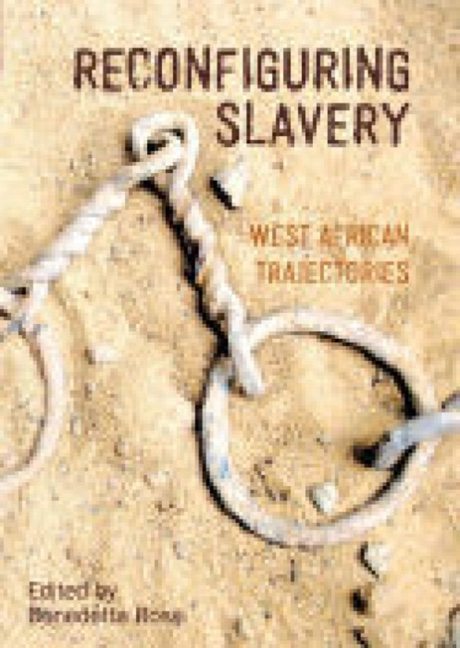Book contents
- Frontmatter
- Content
- List of Figures
- Notes on Contributors
- Preface
- A Note on Language
- Preface to the Second Edition
- 1 Introduction: Rethinking Slavery in West Africa
- 2 Slave Descent and Social Status in Sahara and Sudan
- 3 African American Psychologists, the Atlantic Slave Trade and Ghana: A History of the Present
- 4 After Abolition: Metaphors of Slavery in the Political History of the Gambia
- 5 Islamic Patronage and Republican Emancipation: The Slaves of the Almaami in the Senegal River Valley
- 6 Curse and Blessing: On Post-slavery Modes of Perception and Agency in Benin
- 7 Contemporary Trajectories of Slavery in Haalpulaar Society (Mauritania)
- 8 Slavery and Politics: Stigma, Decentralisation and Political Representation in Niger and Benin
- 9 Slavery and Migration: Social and Physical Mobility in Ader (Niger)
- 10 Discourses on Slavery: Reflections on Forty Years of Research
- Glossary of Foreign Words
- Index
Preface to the Second Edition
- Frontmatter
- Content
- List of Figures
- Notes on Contributors
- Preface
- A Note on Language
- Preface to the Second Edition
- 1 Introduction: Rethinking Slavery in West Africa
- 2 Slave Descent and Social Status in Sahara and Sudan
- 3 African American Psychologists, the Atlantic Slave Trade and Ghana: A History of the Present
- 4 After Abolition: Metaphors of Slavery in the Political History of the Gambia
- 5 Islamic Patronage and Republican Emancipation: The Slaves of the Almaami in the Senegal River Valley
- 6 Curse and Blessing: On Post-slavery Modes of Perception and Agency in Benin
- 7 Contemporary Trajectories of Slavery in Haalpulaar Society (Mauritania)
- 8 Slavery and Politics: Stigma, Decentralisation and Political Representation in Niger and Benin
- 9 Slavery and Migration: Social and Physical Mobility in Ader (Niger)
- 10 Discourses on Slavery: Reflections on Forty Years of Research
- Glossary of Foreign Words
- Index
Summary
When Reconfiguring Slavery: West African Trajectories was first published, it made two main contributions to the field of African slavery studies. Firstly, it shifted the focus away from the ‘end’ or ‘death’ of historical slavery and highlighted slavery's reconfigurations throughout the twentieth century and into the present of West African societies. Secondly, by moving away from slavery's ‘end’ and directly addressing the slow and tortuous process of emancipation, it prioritised the lived experience of slaves and their descendants. Unlike earlier studies that produced bird's–eye views of slavery (and its supposed demise), this book's focus on ‘trajectories’ revealed strategies that were invariably ‘from someone’ and ‘from somewhere’ (Haraway, 1988) – strategies anchored in particular social landscapes and unfolded by individual men and women, youths and elders, ex–slaves still in contact with their former masters, or slave descendants generations removed from the enslavement of their forebears.
Seven years after the publication of the hardback edition, the themes of Reconfiguring Slavery: West African Trajectories continue to be relevant to the study of slavery and post–slavery in West Africa. Empirically, the case studies discussed in these pages are representative of circumstances that are still commonly found in many West African societies. And, analytically, it is still necessary, as suggested in this volume's introduction, to think of slavery today not as a unified reality, but as a fragmented phenomenon that requires qualification: de facto slavery, classificatory slavery, metaphorical slavery and extraverted slavery refer to distinct social and historical phenomena. These concepts were not introduced in an attempt to construct a rigid typology; they are qualifiers aimed at adding nuance and precision to the analysis of slavery in Africa. They continue to have heuristic potential for distinguishing across a plethora of practices characterised as ‘slavery’ in academic writings, heritage discourses, humanitarian appeals and policy reports.
This second edition comes out at a moment when the research field has on the whole embraced the emphasis on the experiential dimension of emancipation advocated in this volume, as attested by the multiplication of efforts to collect and analyse African testimonies on slavery and the slave trade, whenever possible by enslaved persons.
- Type
- Chapter
- Information
- Reconfiguring SlaveryWest African Trajectories, pp. xiv - xixPublisher: Liverpool University PressPrint publication year: 2009



